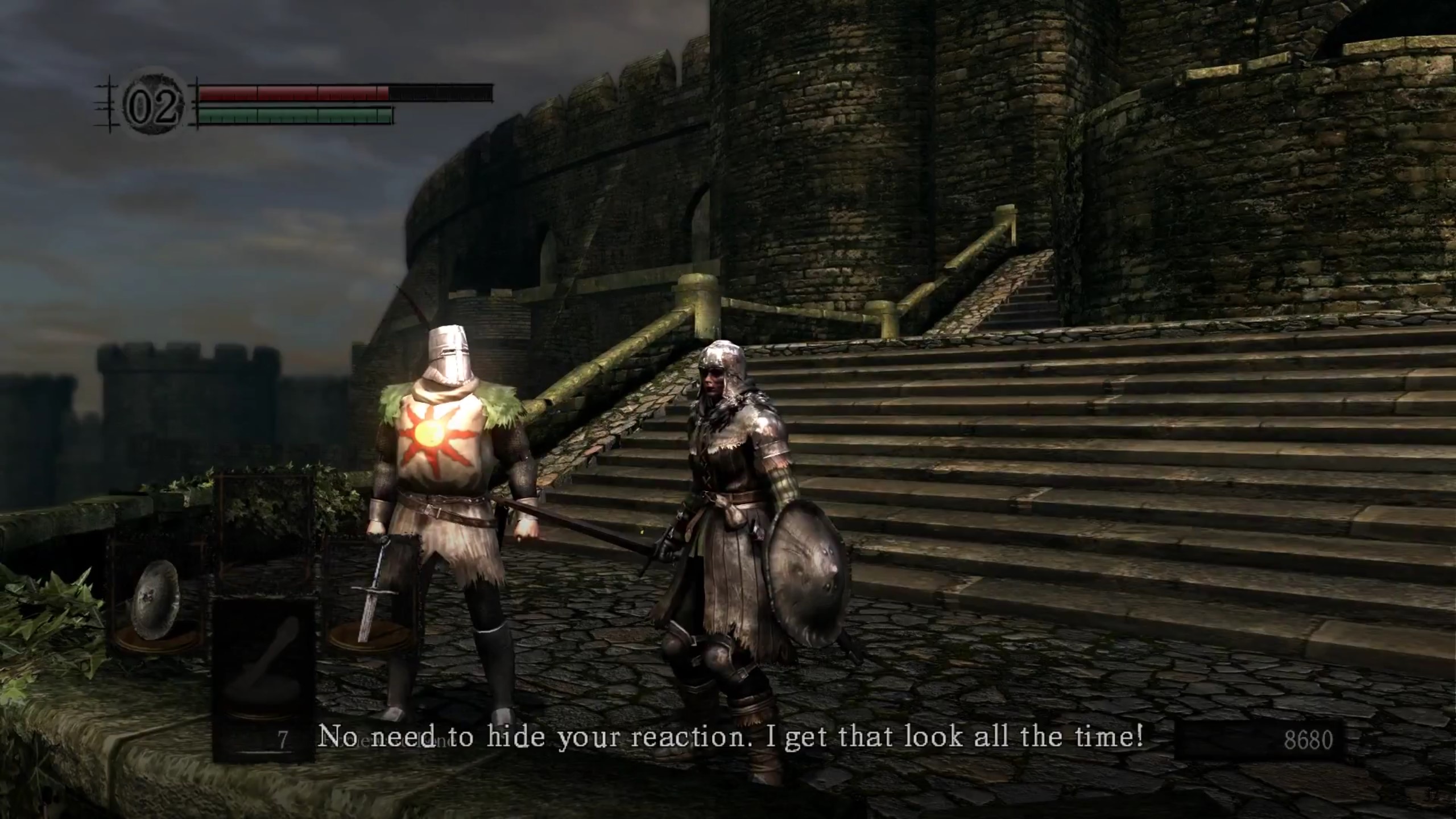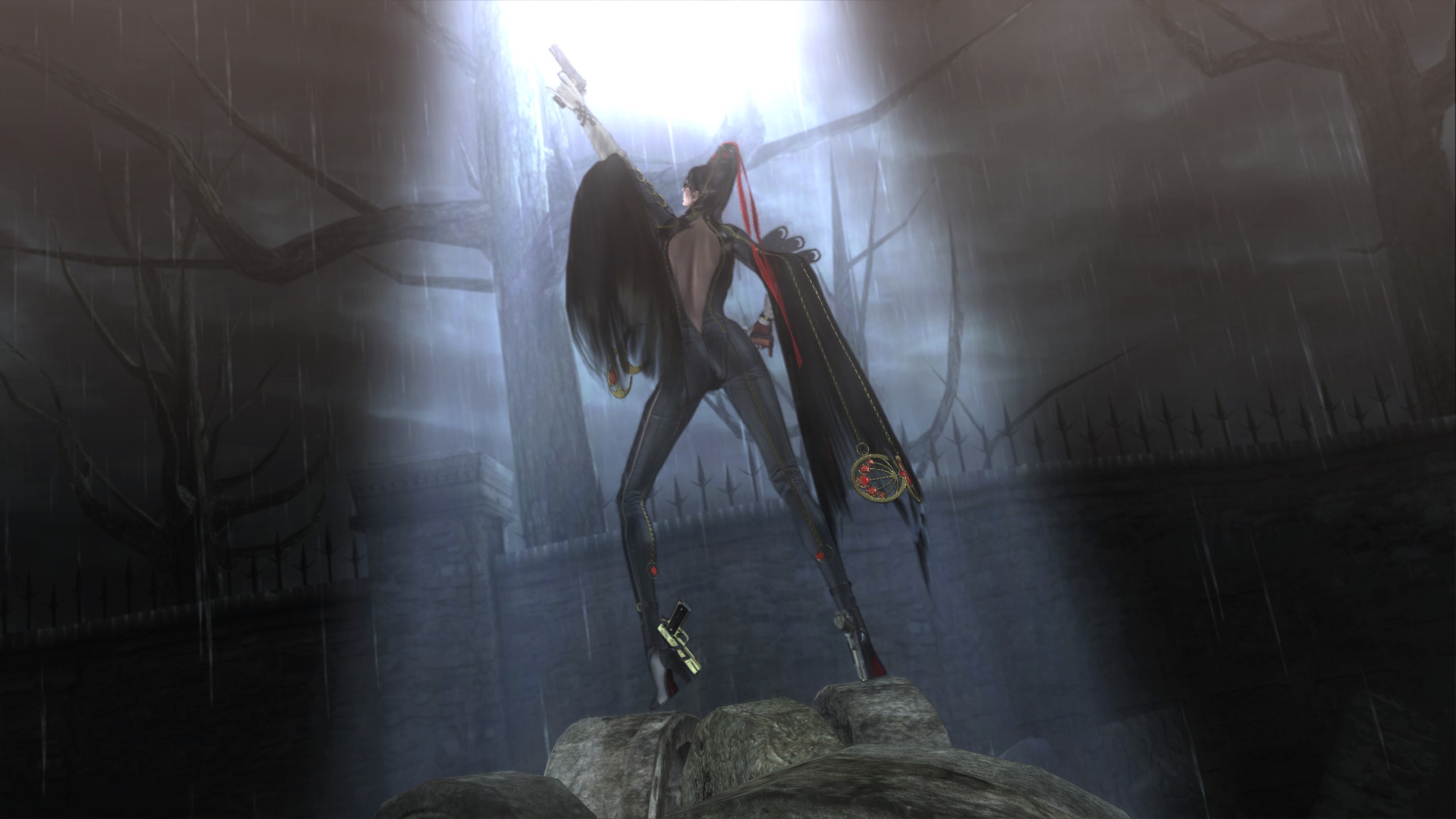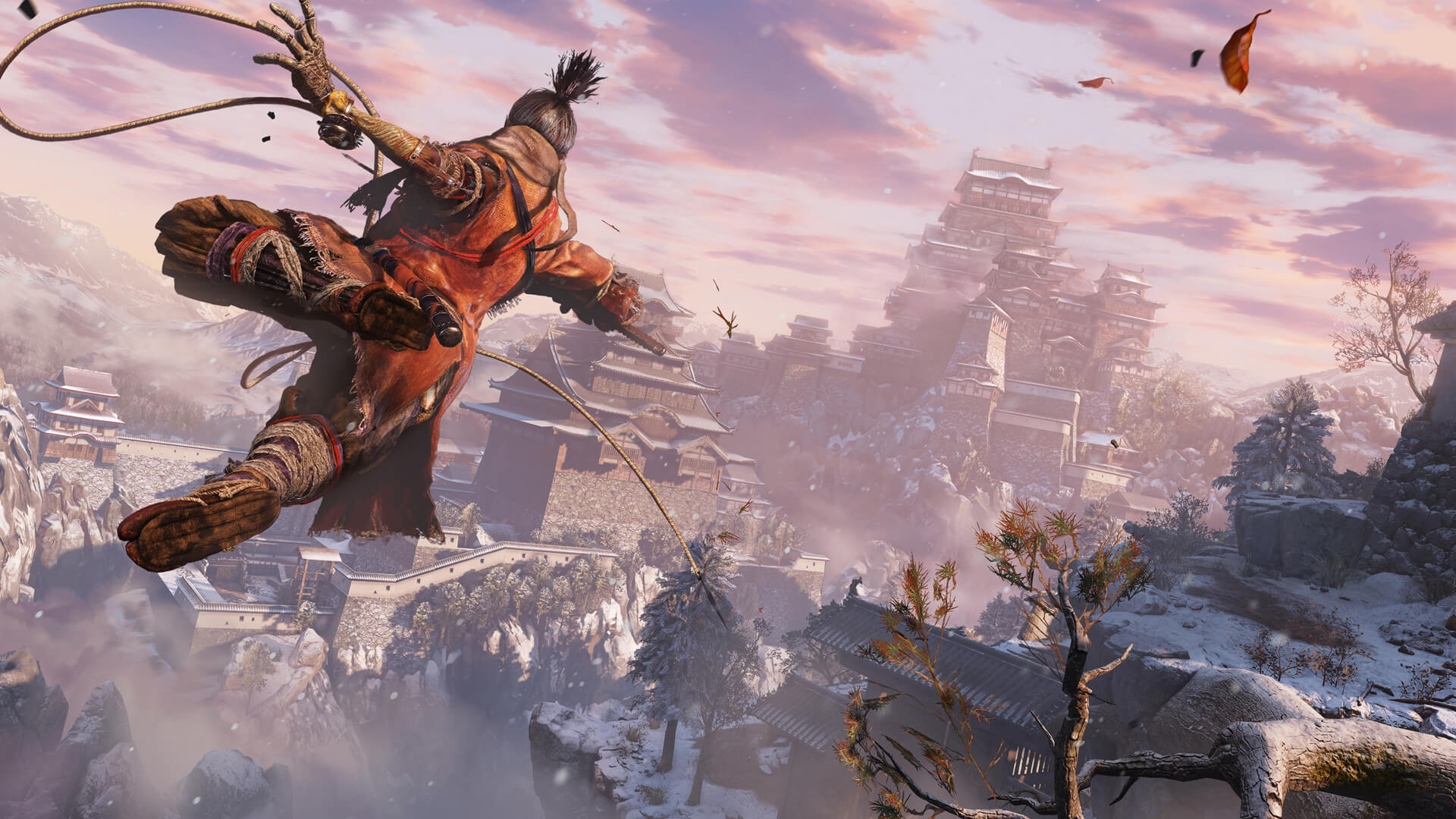
For the last year and a half, I’ve been a little bit obsessed with Dark Souls. I’ve spent a lot of time playing it, thinking about it, discussing it with others, and just trying to work out exactly what I wanted to write here, because I knew I had to write something.
I always expected to love it. Thinking about it now, I’m not quite sure why: it’s very difficult to describe in a way that makes it sound appealing. But something about the way people talked about it, the passion with which my friends and other fans described it to me, convinced me that this was the game design masterpiece I was waiting for, and it was with eager anticipation that I first started the game in February last year.
I didn’t like it.
Dark Souls, released in 2011, is FromSoftware’s most famous game by far. Despite being mechanically quite similar to their 2009 title Demon’s Souls, Dark Souls was the studio’s smash hit, spawning two sequels, multiple ports and remakes, and paving the way for 2015’s Bloodborne and 2019’s Sekiro: Shadows Die Twice.
It is a notoriously difficult game, one that teaches you how to survive by killing you mercilessly and repeatedly until you learn. It is deliberately unfair in ways that few modern games are, taking advantage of the fact that though the player character might die, the player still learns from the experience and can always try again.
And players did learn, and they loved it. When I discuss the game with my friends, and when I read about other people’s experiences, one of the themes that keeps coming up is the feeling of learning; of gradual but perceptible mastery over a system. Competence is a powerful motivator: it feels good to be good at something, and it feels even better to see yourself improve. In Dark Souls, you spend a lot of time retracing your steps between places you’ve already visited, and when you find yourself easily crushing enemies that once destroyed you, you realise how far you’ve come.
Moreover, in Dark Souls, competence feels earned. Those “easy” enemies could still destroy you if you stopped paying attention. It is only because you, the player, have put the time and thought into learning how they work, that they seem so easy. The player character doesn’t get (significantly) stronger throughout the game, it’s really the player who gets better.
The other main source of enjoyment for many people, I think, comes from the sense of accomplishment that accompanies progress. It’s the triumph that comes with defeating a difficult boss, and the joy of finally making it through a difficult section and reaching the next checkpoint. And the difficulty of the games makes victory all the sweeter.
So that, I think, is why people like Dark Souls. There are other reasons, of course. Many love the setting: Lordran, with its majestic, crumbling castles, dark, magical forests and deep, hellish caverns, is a classic fantasy adventure setting turned up to eleven. Its tricky, twisting layout frequently interconnects in surprising ways, and the feeling of finding a shortcut back to a place you’ve already visited is perhaps the greatest reward that the game ever gives you. Others love learning about the history of the world, piecing together the story through the descriptions of items found throughout the game. And everyone loves the weird and wonderful boss designs. But to my mind, these are all secondary. I don’t think anyone really plays Dark Souls for the purpose of exploring its world, and I would be surprised if any but the most hardcore fans work out the full story while playing, without reference to the Dark Souls Wiki. People like Dark Souls because they enjoy overcoming its challenges, and the feeling of growing mastery that playing provides.

My only friend.
Image: Dark Souls: Prepare To Die Edition
So I suppose the real question is: why don’t I?
I think it’s important to try and understand why people have the opinions that they do. That’s why I’ve spent half this post and a good amount of time this past year trying to understand what it is about Dark Souls that people enjoy. So please bear with me as I explore my own feelings about it.
To begin with, I want to address the comment that many Dark Souls fans have in the backs of their minds whenever anyone begins to criticise their favourite game: the “you’re just bad” retort. “Get good and you’ll enjoy it.”
Well, it’s true. I am indeed bad at Dark Souls. But if anything I’ve written in the first half of this post is accurate, that shouldn’t affect my enjoyment of the game. The enjoyment comes from the process of “getting good”. One of Dark Souls’ selling points is its difficulty: if you’re already “good”, you’re enjoying a very different experience to the one it tries to sell, and while that’s really interesting, it’s not the experience for which I picked up the game, and it’s not one that I’m going to explore here.
I think that one of my main issues with the game came from the fact that getting better didn’t feel rewarding to me. Instead, it just felt…rather pointless. I kept asking myself why I should try to improve. Why should I want to get past this section? Why should I want to defeat this boss? Why? There is no reward. All you get after each encounter is another, harder encounter. You try and you try and you try, and all you get is more of the same.
I’d like to take this opportunity to say that, looking at Dark Souls as a piece of art, I actually admire this. The entire “plot” of Dark Souls, such as it is, is based around the idea that in the end, all things die, and your life is ultimately meaningless. After hours of this endless cycle of trying and dying, only to be rewarded with more of the same, you reach the end of the game and what do you get? Well, the best you can hope for is that everything stays the same. It’s just so bleak, and I love it. To see the game’s mechanics tie so strongly into the story is lovely, and shows that FromSoftware clearly knew exactly what they were doing.
But it doesn’t exactly make for a fun player experience.
Getting better at killing enemies in Dark Souls allows you to kill more enemies in Dark Souls. Saying that that is the only payoff would be inaccurate: as I’ve stated already, getting better at something is often intrinsically fun, and I think it’s a core part of the appeal for fans. But personally, that hasn’t been my experience. I haven’t been engaged by that cycle of learning: I’m always looking for something more. Learning on its own doesn’t seem to be enough for me, and without that, what is there? Getting better allows you to kill more enemies, but killing enemies in Dark Souls isn’t something I find fun, so why would I even want to try to progress?
When I think about why I don’t like Dark Souls, I try to think about similar games that I do like, and work out what the differences are. And what I find is that in these games, there’s always something else I can point to from which I derive enjoyment.
Let’s take the most superficially similar game that I enjoy as our example: Bayonetta. Like Dark Souls, Bayonetta is a game in which the player character fights their way through hundreds of increasingly difficult enemies for no adequately explored reason. The general strategy of position, dodge, counterattack is similar, though in Bayonetta it all happens much faster. Bayonetta is also much easier to complete than Dark Souls, thanks in no small part to the abundance of its checkpoints.
My intention here isn’t to say that one of these games is better than the other. They are very different experiences, and both have very different things to say. But they are similar enough that I think it’s worth looking at what they do differently, and why. Why was I motivated to try and improve at one and not the other?
Getting better at killing enemies in Bayonetta allows you to kill more enemies in Bayonetta. But the difference is that killing enemies in Bayonetta is fun. It’s very obviously designed to be fun, too, so much so that it actually feels wrong to be comparing it to Dark Souls. Bayonetta is powerful, carefree and flamboyant, and this comes out through her over-the-top attack animations, satisfying sound effects and jazzy background music. Playing Bayonetta feels great. Being Bayonetta feels great. I learnt to use her moves not so that I could make progress through the game, but because using them was fun.

In Dark Souls, you are a pathetic nobody, and the game reinforces that feeling. That feeling is core to Dark Souls, and changing it would be a mistake. It isn’t an enjoyable feeling, but that’s okay. I’m not saying that there isn’t a place in games for feelings that aren’t enjoyable. My point is that because I didn’t enjoy fighting in Dark Souls, I didn’t feel any motivation to get better at fighting in Dark Souls, because the reward was just more of the thing that I didn’t enjoy.
When I think about other skill-based games I’ve put hundreds of hours into, like osu! and Overwatch, it’s the same story: there was always something about the core gameplay that was enjoyable, and that’s what made me to want to improve.
So I suppose the feeling of improvement on its own isn’t enough for me. What about the feeling of triumph when you overcome a challenge?
This one is easier to answer: it simply isn’t something I’m particularly motivated by.
Okay, let’s dig a little deeper. Obviously, it feels nice to accomplish something. Good puzzle games provide this feeling: when I solve a puzzle in a game like Braid or SpaceChem, I feel satisfied, even though all I’ve really done is unlocked another puzzle to solve. I get a similar feeling in osu! when I clear a difficult song. So why don’t I get this with Dark Souls bosses?
I actually don’t know. My pet theory is this: that the real challenge of working out how to defeat a boss is solved long before you actually defeat it, and the gap between the two means that by the time the boss inevitably dies, you’ve already lost interest in the outcome. In puzzle games, the mental challenge is difficult but the execution is simple, so the reward is immediate and satisfying. In a rhythm game like osu!, there is no mental challenge, but a song can keep surprising you until the final beat, so you can’t feel like you’ve finished until you’ve actually finished. I have no idea whether or not this theory actually holds any water, but whatever the reason, the fact remains that these moments of triumph simply aren’t enough to keep me going.
I know of a few people who initially disliked Dark Souls, but got into the series through FromSoftware’s other games (usually Bloodborne or Dark Souls III). After playing those games, they went back and found that suddenly, they really enjoyed Dark Souls. So maybe there is hope for me yet. Personally, I’m quite interested in their latest offering, Sekiro: Shadows Die Twice.

In Sekiro, you get a grappling hook.
Image: Sekiro: Shadows Die Twice
Sekiro brings two important additions to the series. First, it has a proper story, and gives the player character real motivation for their actions. Second, and perhaps more importantly, movement and combat look fun. Combat in Dark Souls is dull and slow, and it looks dull and slow. Movement options are limited to a casual jog, and a slightly faster casual jog. In Sekiro, the player character can jump and swing about the levels, dashing over rooftops or sneaking up on unsuspecting enemies. With fun gameplay and a proper motivation for the player character, perhaps Sekiro will open the door for me to finally understand Dark Souls.
Or perhaps not. Who knows.
This past year, I have often felt guilty for not enjoying Dark Souls. I felt like I was missing something. Moreover, I felt that I was missing out on something. Now, however, I think I finally understand why I didn’t enjoy it, and why Dark Souls simply isn’t for me. Now, at least until I play Sekiro, I can finally move on.